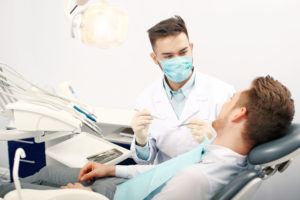The root cause of doctor v. doctor defamation is recurrently a malpractice lawsuit. So, let’s take a look at a recent case that hit headlines, and then review a few slander and libel law basics that apply in medical defamation claims.
Two Doctors + Two Opinions = One Professional Blowup
The roots of this case stretches back five years. At the time, Dr. David Gillis was an emergency room doctor at Indian River Medical Center (IRMC), and Dr. Pranay Ramdev was a vascular surgeon at Lawnwood Medical Center (LMC). Being in relatively close proximity, the two hospitals regularly engaged in patient exchanges.
The Incident That Resulted In A Malpractice Suit
In 2011, Catherine Bollman arrived at Indian River Medical Center’s emergency room; Dr. Gillis was on call. She needed an immediate leg surgery; if not, death was probable.
Doctors determined that patient Bollman would best be served at Lawnwood, so Gillis called the facility and asked Dr. Pranay Ramdev – a vascular surgeon – to perform the surgery. According to reports, Gillis rang Lawnwood twice for confirmation.
But instead of performing the leg surgery, Ramdev left; Other Lawnwood doctors amputated Bollman’s leg; she died several days later from complications. Her husband filed a wrongful death/malpractice lawsuit against Drs. Gillis and Ramdev.
Eventually, a judge dismissed Dr. Gillis from the malpractice lawsuit. Ramdev wasn’t; but he argued that he wasn’t the vascular surgeon on call that night, and, for this reason, not obligated to stay. In the end, Dr. Ramdev settled out of court and allegedly vowed to ruin Gillis, purportedly proclaiming:
“I will make it my life’s mission to prevent Dr. Gillis from ever working at this hospital again, as well as at Sebastian River Medical Center and Lawnwood Medical Center.”
In the wake of the incident, Ramdev supposedly characterized Gillis as “an unethical and incompetent physician” that deserved to lose his job.
Fast forward a few months.
Another patient with vascular complications arrived at IRMC and had to be transported to Lawnwood. Again, Gillis and Ramdev were the two doctors on each end. When Dr. Gillis called to confirm, Dr. Ramdev refused to speak directly to his colleague, instead enlisting an intermediary to relay messages. This time, however, Ramdev didn’t leave; he stayed and operated.
But, according to the nurse on duty that day, Ramdev allegedly “badgered the patient’s husband and inquired … how [Gillis] had examined the patient.” In addition, and again according to the claim, Ramdev allegedly asked a nurse to add a negative comment about Gillis to the patient file. The nurse didn’t comply because she didn’t witness Gillis’ patient exam.
How The Defamation Suit Came About
Around the time of these incidents, the Indian River Medical Center was in the midst of an administrative transition. Reassignments and replacements were rampant. Some of the staff formally asked to stay at the hospital, and Gillis was one of those people. But alas, hospital administrators opted not to renew his contract.
So, Gillis applied at Ramdev’s hospital, Lawnwood, and was offered a position.
After settling in at Lawnwood, Gillis learned that Ramdev had allegedly launched an “anti-Gillis” campaign at the facility.
Fed up with Ramdev’s supposed reputation ruining rampage, Gillis decided to file a professional defamation lawsuit. Curiously though, at the time of this writing, Gillis appears to be employed at Lawnwood.
Does Dr. Gillis have a chance at winning this doctor v. doctor defamation claim? Let’s review.
To Win A Professional Defamation Lawsuit, Doctors Must Prove…
To win defamation lawsuits, plaintiffs must convince jurists that the statements under review are:
- About them;
- Verifiable false statements of fact; and
- Materially injurious to the their reputations or businesses;
In addition, defamation plaintiffs must prove that the defendants:
- Published or broadcast the statements; and
- Acted either negligently or with actual malice, in distributing the material;
In this case, Dr. Gillis must prove that:
- Dr. Ramdev made false statements of fact about Dr. Gillis;
- Ramdev’s statement resulted in material harm for Gillis; and
- Dr. Ramdev acted negligently in relaying the information.
Privilege and Negligence
The facts in Gillis v. Ramdev are straightforward. So, the lawyers probably won’t waste time arguing obscure legal concepts. But they will undoubtedly debate “privilege” and “negligence” during the course of this action.
Privilege
Privilege, legally speaking, is a protective relationship, under the cover of which parties can share information and rumor without fear of liability. For example, doctors and patients enjoy doctor-patient privileges; attorneys and their clients are protected via attorney-client privilege; husbands and wives cannot be forced to testify against each other.
In the overwhelming majority of doctor-on-doctor defamation lawsuits, privilege plays a part. Statements uttered or written in peer reviews are often privileged; they’re also commonly the root of medical defamation claims.
In Gillis v. Ramdev, defense lawyers will undoubtedly argue that privilege existed between Ramdev and the recording nurse. But will it work? Maybe. On one hand, doctors and nurses do enjoy some professional privileges. On the other hand, since the nurse refused to comply with the doctor’s wishes, the privilege defense may not work.
Negligence
Proving negligence is, perhaps, the highest hurdle for defamation plaintiffs. To win slander and libel lawsuits, plaintiffs must prove that the defendants acted in spite of contradictory evidence or proper due diligence.
In Gillis v. Ramdev, however, negligence may be easy to prove. Remember, Ramdev knew the judge dismissed Gillis from the malpractice lawsuit, which effectively absolves Gillis of any professional wrongdoing in that instance. But, Ramdev allegedly continued to besmirch Gillis in a professional capacity, calling him “’an unethical and incompetent physician,’” who had ‘lied’ in the Bollman lawsuit.”
Speak With A Doctor Defamation Attorney
Kelly / Warner works with medical professionals facing reputation challenges – both online and off. Call or message today to learn more about your doctor defamation legal options.


Leave a Reply
Your email is safe with us.